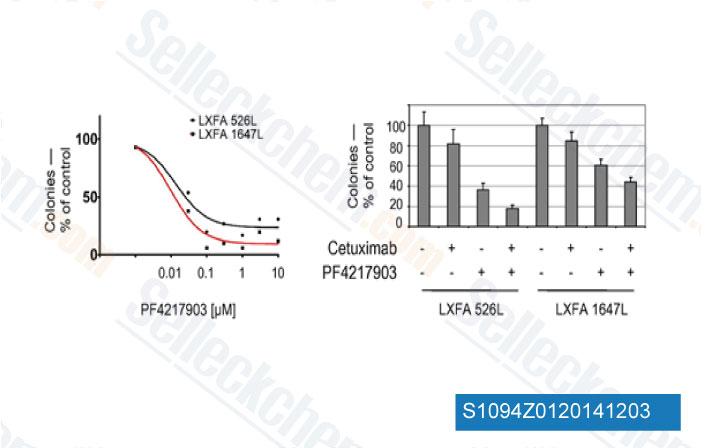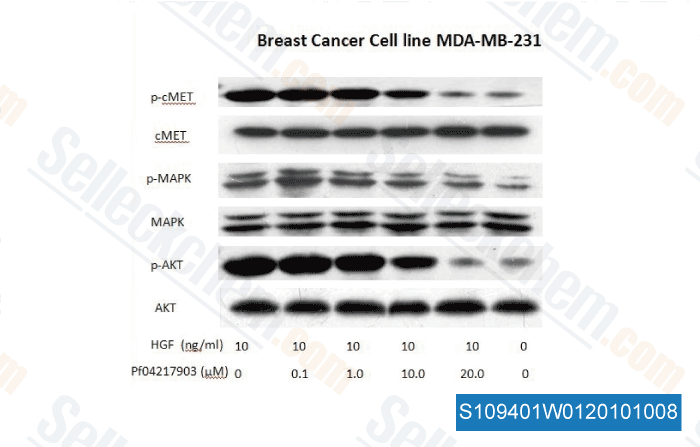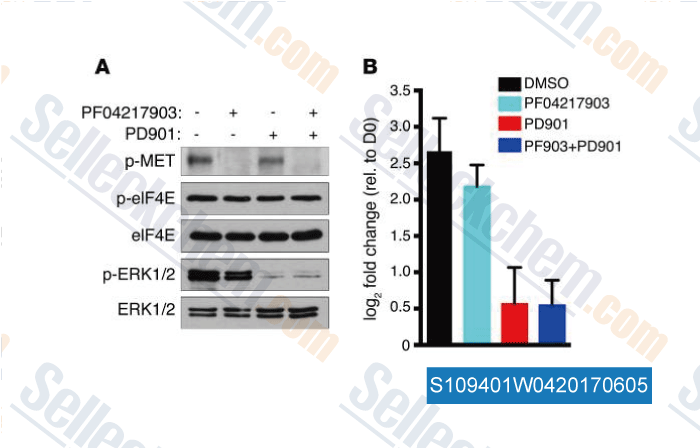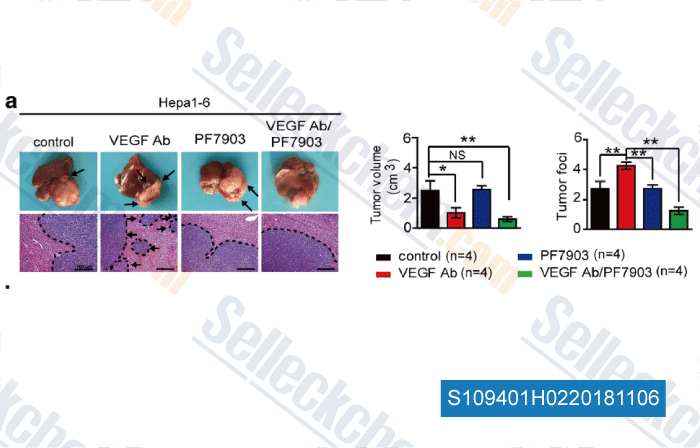|
Toll Free: (877) 796-6397 -- USA and Canada only -- |
Fax: +1-832-582-8590 Orders: +1-832-582-8158 |
Tech Support: +1-832-582-8158 Ext:3 Please provide your Order Number in the email. |
Technical Data
| Formula | C19H16N8O |
|||
| Molecular Weight | 372.38 | CAS No. | 956905-27-4 | |
| Solubility (25°C)* | In vitro | DMSO | 74 mg/mL (198.72 mM) | |
| Water | Insoluble | |||
| Ethanol | Insoluble | |||
|
* <1 mg/ml means slightly soluble or insoluble. * Please note that Selleck tests the solubility of all compounds in-house, and the actual solubility may differ slightly from published values. This is normal and is due to slight batch-to-batch variations. * Room temperature shipping (Stability testing shows this product can be shipped without any cooling measures.) |
||||
Preparing Stock Solutions
Biological Activity
| Description | PF-04217903 is a selective ATP-competitive c-Met inhibitor with IC50 of 4.8 nM in A549 cell line, susceptible to oncogenic mutations (no activity to Y1230C mutant). Phase 1. | ||
|---|---|---|---|
| Targets |
|
||
| In vitro | Being more selective than staurosporine or PF-02341066, PF-04217903 displays >1000-fold selectivity for c-Met over a panel of 208 kinases, although more susceptible to oncogenic mutations of c-Met that attenuate potency than PF-02341066. In addition to WT c-Met, PF-04217903 displays similar potency to inhibit the activity of c-Met-H1094R, c-Met-R988C, and c-Met-T1010I with IC50 of 3.1 nM, 6.4 nM, and 6.7 nM, respectively, but has no inhibitory activity against c-Met-Y1230C with IC50 of >10 μM. [1] PF-04217903 in combination with sunitinib significantly inhibits endothelial cells, but not the tumor cells B16F1, Tib6, EL4, and LLC [2] PF-04217903 significantly inhibits the clonogenic growth of LXFA 526L and LXFA 1647L with IC50 values of 16 nM, and 13 nM, respectively, yielding an additive effect when in combination with cetuximab. [3] PF-04217903 potently inhibits c-Met-driven processes such as cell growth, motility, invasion, and morphology of a variety of tumor cells. PF-04217903 treatment (2 μM) increased cell death of GTL-16 cells, which involves the downregulation of phosphorylated 4E-BP1, ERK/MAPK associated proteins and PI3K/AKT pathway. [4] | ||
| In vivo | Although unable to inhibit tumor growth in the sunitinib-sensitive B16F1 and Tib6 tumor models, the combination of PF-04217903 and sunitinib significantly inhibits tumor growth in sunitinib-resistant EL4, and LLC tumor models compared with sunitinib or PF-04217903 alone by significantly blocking vascular expansion, indicating a functional role for HGF/c-Met axis in the sunitinib-resistant tumors. [2] |
Protocol (from reference)
| Kinase Assay:[1] |
|
|---|---|
| Cell Assay:[2] |
|
| Animal Study:[2] |
|
References
Customer Product Validation

-
Data from [Data independently produced by Eur J Cancer, 2011, 47(8), 1231-43]

-
Data independently produced by , , Dr. Zhang of Tianjin Medical University

-
Data from [Data independently produced by , , J Clin Invest, 2016, 126(6):2181-90]

-
Data from [Data independently produced by , , J Exp Clin Cancer Res, 2018, 37(1):93]
Selleck's PF-04217903 has been cited by 24 publications
| Divergent Polypharmacology-Driven Cellular Activity of Structurally Similar Multi-Kinase Inhibitors through Cumulative Effects on Individual Targets [ Cell Chem Biol, 2019, 10.1016/j.chembiol.2019.06.003] | PubMed: 31257184 |
| Liver X Receptor Agonism Sensitizes a Subset of Hepatocellular Carcinoma to Sorafenib by Dual-Inhibiting MET and EGFR. [ Neoplasia, 2019, 22(1):1-9] | PubMed: 31751859 |
| Off-target based drug repurposing opportunities for tivantinib in acute myeloid leukemia [ Sci Rep, 2019, 9(1):606] | PubMed: 30679640 |
| DRUGPATH - a novel bioinformatic approach identifies DNA-damage pathway as a regulator of size maintenance in human ESCs and iPSCs [ Sci Rep, 2019, 9(1):1897] | PubMed: 30760778 |
| Hgf/Met activation mediates resistance to BRAF inhibition in murine anaplastic thyroid cancers. [ J Clin Invest, 2018, 128(9):4086-4097] | PubMed: 29990309 |
| The dual blockade of MET and VEGFR2 signaling demonstrates pronounced inhibition on tumor growth and metastasis of hepatocellular carcinoma [Zhang Y, et al. J Exp Clin Cancer Res, 2018, 37(1):93] | PubMed: 29712569 |
| MET-targeting antibody (emibetuzumab) and kinase inhibitor (merestinib) as single agent or in combination in a cancer model bearing MET exon 14 skipping. [ Invest New Drugs, 2018, 36(4):536-544] | PubMed: 29188469 |
| Reactive Neutrophil Responses Dependent on the Receptor Tyrosine Kinase c-MET Limit Cancer Immunotherapy. [ Immunity, 2017, 47(4):789-802] | PubMed: 29045907 |
| Cabozantinib Eradicates Advanced Murine Prostate Cancer by Activating Antitumor Innate Immunity. [ Cancer Discov, 2017, 7(7):750-765] | PubMed: 28274958 |
| Cotargeting MNK and MEK kinases induces the regression ofNF1-mutant cancers [ J Clin Invest., 2016, 126(6):2181-2190] | PubMed: None |
RETURN POLICY
Selleck Chemical’s Unconditional Return Policy ensures a smooth online shopping experience for our customers. If you are in any way unsatisfied with your purchase, you may return any item(s) within 7 days of receiving it. In the event of product quality issues, either protocol related or product related problems, you may return any item(s) within 365 days from the original purchase date. Please follow the instructions below when returning products.
SHIPPING AND STORAGE
Selleck products are transported at room temperature. If you receive the product at room temperature, please rest assured, the Selleck Quality Inspection Department has conducted experiments to verify that the normal temperature placement of one month will not affect the biological activity of powder products. After collecting, please store the product according to the requirements described in the datasheet. Most Selleck products are stable under the recommended conditions.
NOT FOR HUMAN, VETERINARY DIAGNOSTIC OR THERAPEUTIC USE.
